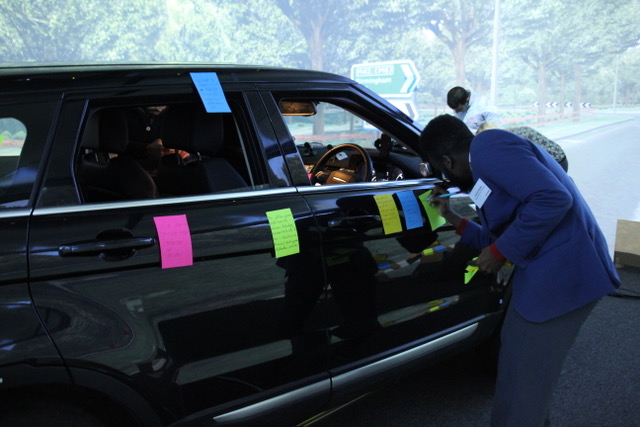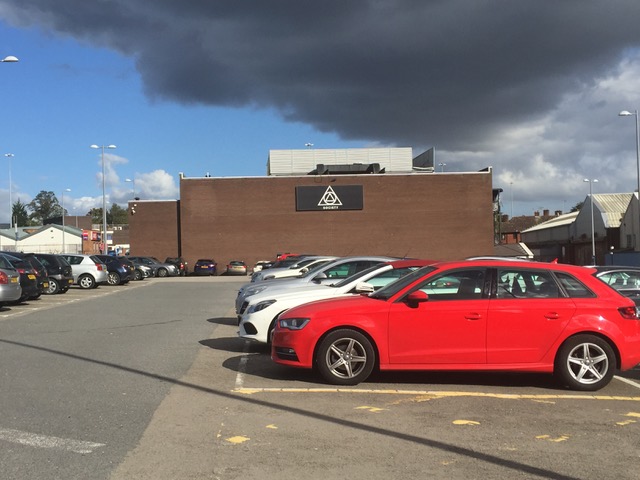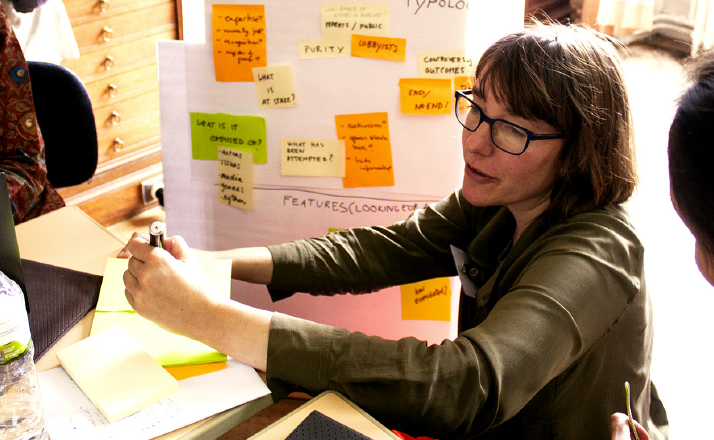Noortje Marres
Keynotes
Apolonija Šušteršič
Wednesday 22nd of August
09:30 – 10:30
Hasselt University, in the Old Prison
Do you have time to participate?
Participation is a form of Democracy and as such it will be discussed within this lecture, formed from the desire and awareness about ourselves, our society, about our living environment and our common space.Between Democracy and Capitalism is obviously a huge contradiction. If Capitalism now-days is seeking for the fast decisions serving to fast profits from which mainly the small circle of people would benefit then Democracy wants to include as many people as possible and create long discussions and processes of decision making that needs to be moderated, and formed after the final conclusion for the benefit of majority.
Apolonija will discuss the relationship between people and our living environment, the democratic process of building space when changing our cities and our neighborhoods, the understanding of spatial equality within the market-driven economy, the need for forming community in a time of mobility and exodus. She will seek out the invisible paradoxes situated in-between the text and the image. The lecture will emphasize and direct the discussion deliberately towards participation with local actors in urban projects. Such projects are a product of an interaction between people and their space, where space is complex composition of matter shaped by the social, political and economic forces.
The questions that arise from such paradoxes are directed to the critique of capitalism and market economy and try to open up other solutions and proposals. What would happen if we would try to ignore the time usually estimated for a specific investment to become profitable, for instance? Through her lecture, Apolonija would like to touch the problematic of so called “model of western democracy” that seems to find itself in the dead end of the lobbyist corridors and neoliberal politics.
Bio
Apolonija Šušteršič (http://apolonijasustersic.com/) is an architect and visual artist. Her work is related to a critical analysis of space; usually focused at the processes and relationships between institutions, cultural politics, urban planning and architecture. Her practice is imbedded within interdisciplinary discourse and usually includes collaborations with other professionals such as architects, urban planners, curators, sociologists, and local population. Together with architect and a professor at KTH (Stockholm), Meike Schalk she formed an operative unit, which occasionally produces research, projects, actions and discussions. Apolonija Šušteršič has a PhD from University of Lund, Malmö Art Academy, Sweden; and runs her own art / architecture studio practice in Oslo, Norway and in Ljubljana, Slovenia. She is a professor in visual art at Oslo National Academy for the Arts, Head of MFA Program: Art & Public Space.
Noortje Marres
Friday 24th of August
14:00 – 15:00
Hasselt University, in the Old Prison
From the lab to the street: what new competences for an intelligent future?
Over the last decade or so, intelligent technology testing has moved from relatively enclosed environments like the laboratory, the factory-floor and the home into public spaces, such as the street. This places new demands on the capacities of the actors involved – engineers, citizens, social researchers, policy makers and designers, … – to envision a shared, societal future. One way to sum up this challenge is by modifying a well-known and enigmatic precept: In the 1990s, engineering was defined as “sociology by other means” (Law, 1991), but to make this true today we need to add new elements, namely participation and design.
In her lecture, Noortje will unpack and advance this claim by investigating a series of recent street trials of intelligent vehicles in the UK and elsewhere. Drawing on empirical materials, from fieldwork notes to debate maps and a design exercise, Noortje will first show how some key elements go missing in contemporary street trials of driverless cars, and how, for this reason, they risk to fail in their attempt to put a proposed technological future to a societal test. Some trials bracket contestation among road users (drivers, cyclists, pedestrians), while others render the social environment passive, reducing it to a décor for machine performance. The result of this is not only to render the societal future unreal, but also, stupid.
So how, then, can design and social research be combined to re-introduce the missing elements, and stage a public encounter between actors, forces and visions – the car system, the ecological future – that so often remain mute to one another, and which, accordingly, fails to take place?
Bio
Noortje Marres (http://noortjemarres.net) is associate professor at the Centre for Interdisciplinary Methodologies (Warwick, UK). Her work contributes to the interdisciplinary field of Science, Technology and Society (STS) and investigatesissues at the intersection of innovation, everyday environments and public life: participation in technological societies; the role of mundane objects and devices in engagement; living experiments; the changing relations between social life and social science in a digital age. She also works on social research methodology, in particular issue mapping, and is interested in developing creative forms of inquiry between the social sciences, computing and the arts. Currently, Noortje is a Visiting Professor in the Centre for Science and Technology Studies at the University of Leiden (the Netherlands), and a Mercator Fellow in the Media of Cooperation Research Programme at the University of Siegen (Germany).



